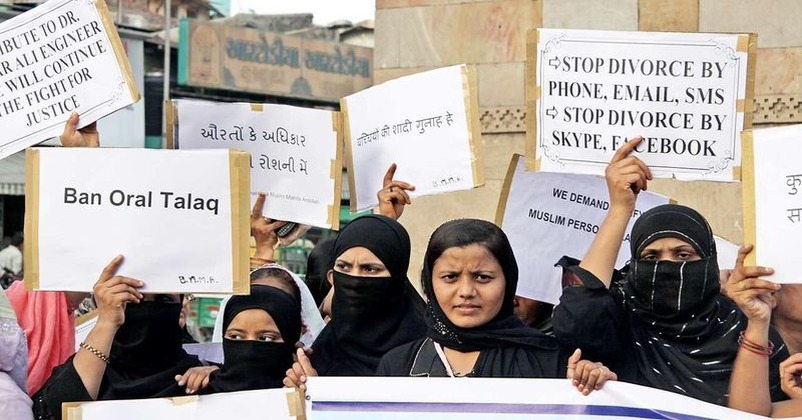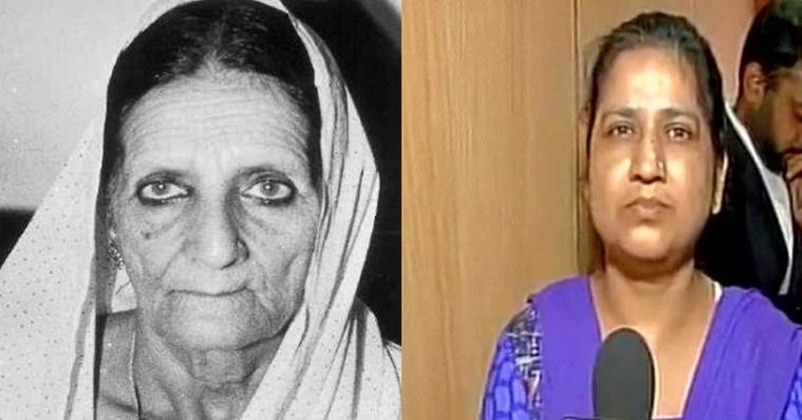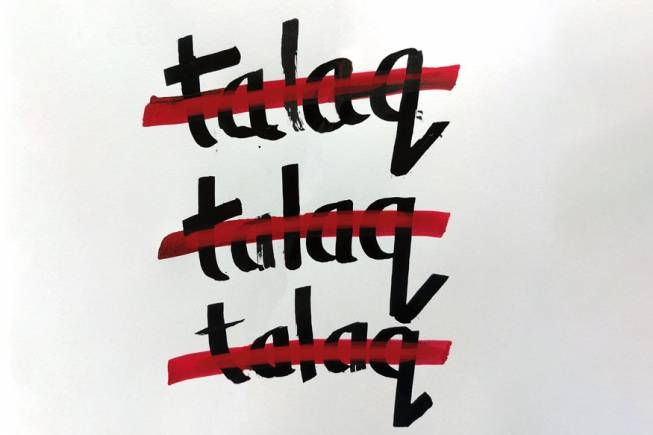Criminalising Instant Triple Talaq or Talaq-e-Bidat: Why it sends jitters among politicians
| Jammu Kashmir Now | The facts and information abou 01-Jan-2019 |

The introduction of a bill that criminalizes triple talaq or talaq-e-bidat has become the eyesore for most of the political parties. Though the opposition is showing that they are genuinely interested in the development and empowerment of Muslim women yet their protest against the bill seems that their only interest is in politics. The major opposition parties comprising of Indian National Congress, AIADMK, Samajwadi Party, Telugu Desam Party (TDP), Rashtriya Janata Dal, Aam Aadmi Party, Nationalist Congress Party, Dravida Munnetra Kazhagam, Bahujan Samaj Party and Communist Party of India, CPI (M) are not accepting the present bill because they think that the bill targets a particular community. The recent opposition to the bill came from former CM of Jammu and Kashmir Mehbooba Mufti, who herself gone through the broken marriage yet she finds it wrong when any bill empowering Muslim women has been introduced in the parliament. Though the practice of instant triple talaq or talaq-e-bidat is prevailing in a particular community yet it is surprising why and how opposition wants to cover other communities through this bill. The Congress MP Shahshi Tharoor said that the bill targeted at a particular community by forgetting that the practice of instant triple talaq is followed only in one religious community.
From Shah Bano to Shayara Bano
In April 1978, Shah Bano a 62 years old Muslim woman filed a petition in court demanding maintenance from her divorced husband Mohammed Ahmad Khan, a renowned lawyer in Indore, Madhya Pradesh. Khan had granted her irrevocable talaq later in November. The two married in 1932 and had five children, 3 sons and 2 daughters. Shah Bano sought maintenance for herself and her five children. She filed a petition under Section 125 of the Code of Criminal Procedure, 1973, as this section of CrPC put legal obligation on man to provide maintenance for his wife during the marriage and after divorce too if she isn’t able to fend for herself. But Khan contested the claim on the premise that the Muslim Personal Law in India required the husband to only provide maintenance for the iddat period after divorce. The period of iddat is generally 2-3 three months after divorce or death of her husband or incase of pregnancy, the maintenance is given till the birth of the child. All India Muslim Personal Law Board supported Khan in this regard. After detailed arguments, the Supreme Court of India upheld that section 125 of CrPC, 1973 is applicable to all the Indian citizens irrespective of their religion. The judgment of the Supreme Court was a milestone but the Rajiv Gandhi led Congress government, elected in 1984, passed the Muslim Women (Protection on Divorce Act), 1986 that overturned the verdict of the Supreme Court. The law said that the maintenance should be given only for the period of iddat. The Shah Bano’s lawyer challenged the constitutional validity of the law but the Supreme Court upheld the validity of the law though it said that the liability can’t be restricted to the period of iddat. Lastly, Shah Bano had to withdraw her case, as neither the apex court nor the then government was genuinely interested in the development and empowerment of Muslim women. Similarly, in March 2004, the PDP, NC and the Congress - led coalition government made an unsuccessful attempt to overturn the Jammu and Kashmir High Court’s landmark judgment of 2002, in which the court established that the women of J&K state would continue to keep their PRC even if they marry an outsider and non-PRC holder.
In the Shayara Bano case, the petitioner demanded that talaq-e-biddat or instant triple talaq by her husband should be declared void. It was never going to be easy for Ms. Bano and the other women to garner support from the community as they were seen challenging the male dominance of Shariat laws, and was suspected by a section of anti-BJP groups and male Muslim intelligentsia of playing into the saffron party’s strategy to communalise the discourse ahead of the 2017 Assembly elections in Uttar Pradesh. Though the practice has been banned in many Muslim countries including Pakistan but the practice was continued in India and the self-proclaimed defendant of the religion said that the apex court must refrain from meddling into religious affairs. But a five judge bench of the Supreme Court declared the practice of instant triple talaq void, illegal and unconstitutional. The Supreme Court in this case also asked the central government to enact a law in this regard so that this practice may be abolished. Ironically event after the Supreme Court of India declared it unconstitutional, the number of instant triple talaq cases is increasing.

The Triple Talaq Bill sailed through Lok Sabha
Even after the apex court verdict, the cases of triple talaq have been reported therefore, the central government issued ordinance to enforce ban on this inhuman practice. Now, the Government is trying hard to push through the bill on triple talaq from parliament and make it a law. In Lok Sabha 245 MPs voted in favour of the Bill, while 11 voted against it and the bill easily passed through from here. The Congress party and AIADMK staged a walkout ahead of voting on the Bill. Though many political parties showed their support to the apex court verdict on triple talaq yet their action speak different story altogether.
Triple talaq bill stalled in Rajya Sabha
Passing of the triple talaq bill was a herculean task for the government in Rajya Sabha because of the obvious mentality of vote-bank politics in the opposition camp. Muslims constitute a major vote-bank in Indian politics, as almost all the Muslims cast their votes in all the elections. Therefore, no political parties would leave the chance to appease them even if it means violating somebody’s rights and going astray from once cherished values and the same was observed in Rajya Sabha. The government introduced the bill in Rajya Sabha and was ready to have discussion but the opposition instead of having a discussion wanted that the bill must go to select committee. The opposition considers it a civil matter whereas the government wanted to make it a penal offence.
Important facts about triple talaq
- India is home to world's third-largest Muslim population which is governed by the Sharia or Islamic jurisprudence.
- A modified of Talaq (divorce), instant Triple Talaq is not as per Quranic principles or teachings. For talaq-e-sunnah (Islamic divorce), the Quran purports efforts of reconciliation and giving notice to the wife over an extended period of up to three months, with the pronouncement of ‘talaq’ staggered over this period of time. When the third and final ‘talaq’ is given, even after the conciliatory efforts and the breaks in between, the divorce is deemed final and therefore irrevocable. In this manner, time is given to both man and woman to understand their problem in right perspective and take appropriate steps.
- According to Census 2011 data, out of all married Muslim women 13.5 % were married even before the age of 15 and 49% were married between 14 and 19 years of age. Marriage at such an early age, in most of the cases, decreases the possibility for a Muslim woman to acquire education or being financially sound.
- All India Muslim Personal Board (AIMPLB) wanted that the SC should not have interfered in triple talaq as the issues fell outside the realm of judiciary. Though this practice was affecting the lives of millions of women.
- The cases of divorces through instant triple talaq reported even after the Supreme Court of India declared it void, illegal and unconstitutional. India's 90 million Muslim women continuously face the threat of a sudden, oral, and out-of-court divorce in the form of instant triple talaq though the Apex Court of the country has declared it void, illegal and unconstitutional.
- Talaq-e-bidat or instant triple talaq is a Sharia law practice, wherein the Muslim men are given power to divorce their wife by instantly uttering the word ‘talaq’ thrice.
- Pakistan, Bangladesh and many other Islamic countries banned the practice of talaq-e-bidat or instant triple talaq, but not India.
- A survey by Bharatiya Muslim Mahila Andolan revealed that 79% of divorced women received no maintenance from their husbands, more than 40% divorced women were not able to retrieve their belongings and jewelleries from their husband’s home, more than 50% were not able to retrieved their mehr and those who got received, it was in the range of Rs 501 to 786, 59% percent women were divorced orally by uttering the word ‘talaq’ thrice, more than 50% husbands married immediately after divorcing their wife and 92.1% Muslim women wanted this biased system of verbal triple talaq to stop.
- The instant triple talaq suddenly make the Muslim women without any help and they may not be in a position to immediately become the breadwinner and manage kids. They get divorced on trivial issues.
- Since, this practice is followed among Muslims, the present bill targets at empowering the Muslim women. Certain political parties considered it biased and against one particular religious community. Hence, they see it as a threat to secularism though the bill actually breaks the patriarchal values and traditional notions about the role of women in society.

Instant triple talaq practice creates a psychological trauma and the Muslim women remain without any substantial means of livelihood in a matter of few seconds and in this manner, their situation is more vulnerable than the women in other religions who are divorced by their husband. Therefore, stringent law is required to tackle the problem faced by Muslim women in this regard. Hence, the bill on triple talaq is required. Also, the cases of instant triple talaq have not been dwindled though the apex court has given verdict in this matter. Therefore, the onus was on the central government to make a law in this regard to get rid of this abhorred practice that discriminates the Muslim women. Therefore, the central government is pushing hard to make it the law and got it passed through Lok Sabha but the bill could not get through Rajya Sabha.
Leaving this matter as a civil dispute means making the law without teeth and it would hardly have any impact on the mentality of the men, who want to dominate their spouse. Ironically, the lives of thousands of Muslims women have been subjected to vote bank politics in this matter and present dispensation in opposition camp has been sidelining humanity over the politics of appeasement.
The Muslim women have to struggle from Shah Bano to Shayara Bano to get this inhuman practice annulled in one of the largest secular and democratic country i.e. India. Unfortunately, the political parties like Congress, PDP etc. have historically obstructed the Muslim women’s right to get gender justice and institutionalized the discriminatory practices among Muslims and the same episode is repeated in the present case.
